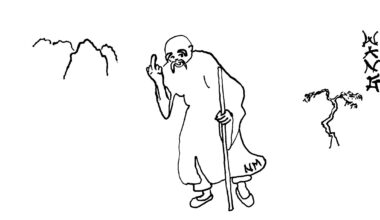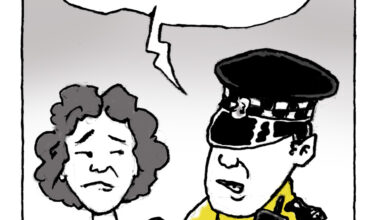
During the pandemic, outlets that had previously turned to me for pieces on Brexit or prorogation or the Northern Ireland Protocol started asking me to write about coronavirus. At first, the requests concerned legal questions — the difference between a fixed penalty notice and a fine, say, or how judicial review works. These fell within my area of expertise, and I was happy to provide clarity.
Like many lawyers, I also became alarmed at attacks on civil liberties and began to criticise what the government was doing. For reasons obscure to me, the single worst encroachment acquired a dreadful name. ‘Lockdown’ is a term borrowed from prison management and came to describe a situation where states were effectively incarcerating their populations. Worse, of all the politicians to issue a stay-at-home order, it had to be the least serious man the UK’s political system has produced in recent decades. Every time Boris opened his mouth, I half expected to hear a ba-dum-tss at the end of each sentence. It was like being conscripted by Groucho Marx.
However, my view that civil liberties are as important as scientific truth — and that civil liberties and scientific truth are incommensurable with each other — only crystallised when those same publishers started asking me to analyse various restrictions on a scientific, not a legal, basis. This I refused to do, partly due to lack of expertise, but mainly because I thought my civil liberties arguments stood on their merits. They did not need to be set off against science or weighed in some sort of balance with science on the other side.
Coronavirus exposed how human beings argue about incommensurable values. By this, I mean values that are not comparable on some common scale — values that are intrinsically different. Those on one side, who thought managing coronavirus turned on following the science and heeding scientists like Chris Whitty and Neil Ferguson (who perhaps enjoyed the power), and those on the other side, who thought people had a right to object to having their lives micromanaged by the state, gave every appearance of coming from different planets. The two groups were appealing to values so unalike in kind that they could only ever talk past each other.
Complicating matters was the fact that lockdowns were popular — at least until higher-ups began breaching lockdown rules themselves, starting with Ferguson himself, then Dominic Cummings, next a gaggle of journalists, and finally Boris, No. 10, and chunks of the civil service. Liberals on both left and right often fail to appreciate how people quite like paternalism. From time to time, when voters are given a straight-up choice between paternalism and liberalism, paternalism wins by a landslide. Only when the costs of lockdown and school closures became clear did individuals as powerful as former Chancellor Rishi Sunak break ranks and start saying, ‘we shouldn’t have empowered the scientists in the way we did.’
This electoral reality led many of those sceptical of not only lockdowns but other Covid-induced civil liberties infringements to abandon their positions. They then opted – in my view, foolishly – to fight on the enemy’s terrain: science, ‘following the science,’ and scientific truth. We all witnessed unedifying spectacles as the lunatic fringes on both sides proceeded to disgrace themselves. There was a moment there when I wanted to put the Church of Maskitarianism in the arena against Anti-Vaxxers United and let them fight it out to the death.
Those who believe that there are incommensurable values present throughout civil society are known as ethical pluralists. Those who believe that human values can ultimately be reduced to one super-value, such as utility, or happiness, are known as ethical monists. During Covid, civil liberties — even among reputable human rights organisations and think-tanks — were sidelined. The ethical monists won. They won not because there was no debate. There certainly was a debate; unfortunately, it was a contest between competing scientific visions.
The dominance of economics over the way we talk publicly about the things we esteem in human life, and the way this has played into so-called ‘evidence-based policy’, has meant that public discourse is often, de facto, a form of ethical monism. In other words, the monist argues that apparently different values, once properly understood — that is, translated in terms of the super-value — can be plotted on the same scale, and thus easily compared, by assigning each some sort of numerical value: Value A has X units of super-value Alpha, value B has Y units of super-value Alpha.
Therefore, in deciding between the two, you have only to compare X and Y to see which is the greater. Moral decision-making is that straightforward. Even Sunak’s recent, and thoughtful, interventions — where he complained of SAGE scientists’ refusal ‘to acknowledge trade-offs’ — falls wholly within a monist, consequentialist framework that assigns incommensurable things some common and comparable value.
The problem, of course, is that ‘civil liberties’ and ‘scientific truth’ cannot be fitted into one value scale. However, based on conversations I have had with former colleagues, it seems many people do think it is possible to reduce all values to one super-value, like, say, utility. Lawyers, meanwhile, many of whom disagree with this claim, tend to be ethical pluralists.
Ethical pluralism is commonly associated with political philosopher Isaiah Berlin. However, the approach was first articulated by Sir James Fitzjames Stephen, a distinguished Victorian jurist and later a High Court judge. Berlin’s acknowledgement of this had the effect of partially rehabilitating Stephen’s reputation. Previously, he had been written off as reactionary, in part because when he developed ethical pluralism, his interlocutor was none other than John Stuart Mill. Indeed, the two men had several long-running clashes.
In Liberty, Equality, Fraternity (1874), Stephens argued, contra Mill in On Liberty, not only that law without force was empty, but that Mill’s utilitarianism had a flattening effect on moral disputes. Stephen pointed out that when people keep disagreeing, the person who thinks moral decision-making is a simple calculation between comparable goods is forced to reach for some alternative explanation for the rancour. Very often, he claimed, the alternative explanation is to question the intellect or good faith or motives of those on the other side:
‘There are differences which can neither be left unsettled nor be settled without a struggle, and a real one, but regarding which the struggle is rather between inconsistent forms of good than between good and evil. In cases of this sort no one need see an occasion for anything more than a good-tempered trial of strength and skill […] There is no surer mark of a poor, contemptible, cowardly character than the inability to conduct disputes of this sort with fairness, temper, humanity, goodwill to antagonists, and a determination to accept a fair defeat in good part and to make the best of it.’
During lockdown, it became easy and common for people on one side to write off all lockdown sceptics as conspiracists, and people on the other side to write off all lockdown supporters as authoritarians. That is what happens when ethical monists fail to grapple with disagreement over incommensurable values.
Monism, with its seductive promise to enable decision-making without conflict, is a noble aim. But it is misconceived. If values are genuinely incommensurate, then the contest between them is inherently fraught. There is no right answer. The fight will go on until one side is defeated and left, in Stephen’s words, ‘to make the best of it.’
Would it have made a difference if lockdown sceptics had not pivoted to science, fighting instead for civil liberties? That, I suspect, is a Known Unknown. I do think it would have made for a more reasoned, less fraught debate. It is hard for many people, on all sides of politics, to dismiss civil liberties out of hand. Civil liberties in modern liberal democracies do have a rich and storied heritage, which goes back to classical antiquity. They resonate.
On a related note, the immense fixed penalty notices handed out by the authorities, some as high as £10,000, were often contested by a committed team of civil liberties lawyers, including barristers Adam Wagner and Francis Hoar. Many of the people saddled with them — commonly university students and small businesses — had no capacity to repay such vast sums. Going to trial had the effect of turning them into much smaller fines, since the law requires that fines must be reasonably capable of repayment. The Manchester Metropolitan University students fined for tearing down the barriers confining them to their halls of residence, protesting, and (in jest) renaming the institution HMP MMU, had a point. Unfortunately, the main difference between fixed penalty notices and fines — as far as the law is concerned — is that with the latter, convictions are recorded.
Had those matters been litigated in the context of a broader debate between partisans of science and partisans of liberty, they might have shifted the dial at least a little. People other than lawyers would have been alarmed at old folk dying alone, or hospitality firms bankrupted up and down the country. And they would have been able to say with more confidence that these were things to which ‘scientific truth’ has no answer.
For what it is worth, supporters of mandatory vaccination who argue ‘my body, my choice’ in other circumstances have now created serious cognitive dissonance for themselves. Meanwhile, I simply do not think a modern liberal state can justify lockdowns.
Enjoy this article? Subscribe to our free fortnightly newsletter for the latest updates on freethought.








6 comments
Excellent article and I’ve enjoyed watching Helen Dale on Talk Radio etc.
Is it not the case however that that by not engaging with the veracity of the scientific advice, we ignore the possibility that bad and illogical and unjustified scientific advice is being used as a tool to directly and deliberately harm civil liberties?
(In effect in the UK panic and political cynicism, ideology and neuroticism within ‘the science’ outweighed such cynical utility for only about six weeks from lockdown 23 March. After that it was fully consciously the tool, even if the other motives/psychoses remained)
There is a danger that my comment above will be seen as emphatically missing the point, but its intention is to strengthen the argument for engaging in both liberty and ‘science’ dually, as well as pointing out where they perhaps meet.
For what it’s worth if I challenge the sense and accountability and health outcomes of these health policies, there is often no argument back other than the fact that I’m disguising the fact that I’m only interested in my civil liberties. The opposing individuals are wedded to trust of public health authorities – no scrutiny, no accountability, and they write off those who want to scrutinise.
That’s the argument – that once you trust certain people and their instructions 100% in certain situations, clearly liberty is irrelevant. To them it’s like going in for a major operation and being put under anaesthetic. And that’s right and appropriate, if that trust is decided upon. Which, in fact, I think points to all issues being about the quality of the science. If they were to have doubts about the hygiene of the hospital for such an operation, and were to see rats in the anaethetising room, they might not surrender their liberty and consciousness.
Whilst nothing as obvious as ‘rats’ sullied the social distancing or mask mandates, the authorities’ own lies or changed minds about purposes like flattening curves rather than reducing deaths, their refusals to put deaths in context, and disclarity about what constitutes an emergency; refusal to engage with infection fatality rates, refusals to have an open exit strategy, etc, etc., are things that quickly smlled like rats.
I would be very interested to hear your thoughts about how the system, in its bruised and hypersensitive state after covid, might respond if a new kind of pathogen began spreading wildly around the planet again. In some ways our socially engineered systems are themselves akin to an immune system, with a tendency to sometimes react too slowly to a new threat, then over-react and cause senseless damage. It is very difficult to get the balance right for situations built around exponential growth of consequences.
I’d be prepared to put forward an analogy where the T cells were society – and the memory is held crucially by the mass media, and also the WEF, WHO, and some of those in government. The antibody (non-remembering) response would be from the people.
Preventing death is usually given a high value, easy to sell with covid as we saw refrigerator cars full of bodies on tv. But, the “science” could just as well have supported an approach like Sweden’s, once it became clear that the risk of death was heavily skewed towards the very old.
I realise this is by now quite an old article, but I’ve only just seen it, and felt I had to comment.
Whilst I see what you’re saying, you are dead wrong to suggest that the science and civil liberties were completely independent. The most fundamental human right is to life, closely followed by health. We were faced with a highly infectious and deadly pathogen, with the NHS already overwhelmed by the time Boris acted. Until the science became clearer, lockdown was the only way to get on top of the situation. I live in NW England. The Cheetham Hill area of Salford is largely of Asian origin. Their culture places more emphasis on close family ties. When the lockdown order was issued, it was widely disregarded, and people were dying en masse. In other areas, like where I live, the lockdown was respected, and there were very low figures. Clearly, the Asian population felt that their freedom to pop round for a chat was more important than their neighbours’ right to life, and many died because of it.
I work for a company that writes software for the NHS. We work closely with the people who were fighting this head on, and unlike many news stories, this was not blown out of all proportion. Much of our software needed to be rewritten in order to facilitate more flexible ways of arranging clinics etc., with greater emphasis on telephone and video consultations. We needed time to implement these changes, and until then, the NHS was completely swamped. Were it not for lockdown, which bought time until the vaccines were developed, apart from the vastly greater number of deaths that would have directly resulted, due to there being no capacity to treat the increased numbers, we would have had major problems even now, because of the number of people with other conditions who would have been unable to get a diagnosis or treatment.
Of course, once the science became clearer, more informed decisions could be made. The real problem was Boris Johnson’s initial slowness to act. This meant that by the time he did, the disease was already rampant and lockdown was more of a firefighting exercise. Had he taken the decision to impose lockdown at the earliest opportunity, it needn’t have been as draconian, nor long lasting. The NHS would not have been overwhelmed, so more locally tuned lockdowns could have been instigated much earlier.
My employers did react swiftly, and took the bold decision that we would all work from home. This kept the business working when the rest of the country was like a rabbit in headlights. Some of us inevitably caught the virus, mostly after the vaccinations had started, but had we been in the offices, the entire business would have been in complete chaos. We may well have lost some of our older staff, which includes myself, and we probably wouldn’t have been able to deliver the changes that the NHS desperately needed. This decision was informed by science, and I’m deeply grateful for it.
The bottom line is that I am probably alive today because we didn’t wait for Boris but relied on science to make the call. My temporary lack of liberty was a small price to pay for this. Science and civil liberties are not at all independent. Both should be weighed, but when science says that many thousands of people will die, or be seriously ill, if their advice is not heeded, I will side with science every time. I’m a Libertarian, and I value civil liberties greatly, but I’m also a pragmatist. Dogma is invariably bad, whether it’s religious fundamentalism, or Libertarianism. I want liberty, but not the liberty to put the lives of my friends and neighbours in jeopardy, or for them to endanger mine.
Your email address will not be published. Comments are subject to our Community Guidelines. Required fields are marked *
Donate